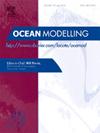Developing Intelligent Earth System Models : An AI scheme of K-profile parameterization and stable coupling into CESM with FTA
IF 2.9
3区 地球科学
Q2 METEOROLOGY & ATMOSPHERIC SCIENCES
引用次数: 0
Abstract
Parameterization schemes in numerical models are employed to represent the effects of subgrid-scale physical processes but are often limited by incomplete understanding of physical processes and computational constraints, leading to inaccuracies and inefficiencies. Artificial intelligence (AI) models have been introduced to enhance simulation accuracy or computational efficiency. However, hybrid Earth System Models (ESMs), which integrate AI into traditional frameworks, must also consider stability in coupled simulations. In this study, we replace the default K-profile parameterization (KPP) in Community Earth System Model (CESM) with a transformer-based AI model (KPP-DL). We first perform offline evaluations, demonstrating the AI model’s ability to closely replicate KPP’s key outputs. Subsequently, we couple KPP-DL into CESM via Fortran-Torch adaptor (FTA) and evaluate the hybrid CESM’s performance in terms of accuracy, stability, and computational efficiency. Hybrid CESM maintains stable operation for at least 3 years, with approximately a 3-5 times improvement in the computational efficiency of vertical mixing. During online coupled simulations, KPP-DL exhibits strong agreement with KPP in simulating key vertical mixing coefficients while hybrid CESM produces consistent results for variables such as temperature and salinity. Our results highlight the potential of AI-driven approaches to achieve accuracy approaching that of KPP and stability coupled in ESMs while improving the efficiency, suggesting that intelligent ESMs represent a promising future direction for numerical modeling.
开发智能地球系统模型:一种k -廓线参数化和与FTA稳定耦合的人工智能方案
数值模型中的参数化方案被用来表示亚网格尺度物理过程的影响,但往往受到对物理过程的不完全理解和计算约束的限制,导致不准确和低效率。人工智能(AI)模型被引入以提高仿真精度或计算效率。然而,将人工智能集成到传统框架中的混合地球系统模型(ESMs)也必须考虑耦合模拟的稳定性。在本研究中,我们用基于变压器的人工智能模型(KPP- dl)取代了社区地球系统模型(CESM)中默认的k -剖面参数化(KPP)。我们首先进行离线评估,展示了人工智能模型密切复制KPP关键输出的能力。随后,我们通过Fortran-Torch适配器(FTA)将KPP-DL耦合到CESM中,并从精度、稳定性和计算效率方面评估混合CESM的性能。混合CESM保持稳定运行至少3年,垂直混合的计算效率提高了约3-5倍。在在线耦合模拟中,KPP- dl与KPP在模拟关键垂直混合系数方面表现出很强的一致性,而混合CESM对温度和盐度等变量的模拟结果一致。我们的研究结果强调了人工智能驱动的方法在提高效率的同时实现接近KPP和稳定性耦合在esm中的精度的潜力,这表明智能esm代表了数值模拟的一个有希望的未来方向。
本文章由计算机程序翻译,如有差异,请以英文原文为准。
求助全文
约1分钟内获得全文
求助全文
来源期刊

Ocean Modelling
地学-海洋学
CiteScore
5.50
自引率
9.40%
发文量
86
审稿时长
19.6 weeks
期刊介绍:
The main objective of Ocean Modelling is to provide rapid communication between those interested in ocean modelling, whether through direct observation, or through analytical, numerical or laboratory models, and including interactions between physical and biogeochemical or biological phenomena. Because of the intimate links between ocean and atmosphere, involvement of scientists interested in influences of either medium on the other is welcome. The journal has a wide scope and includes ocean-atmosphere interaction in various forms as well as pure ocean results. In addition to primary peer-reviewed papers, the journal provides review papers, preliminary communications, and discussions.
 求助内容:
求助内容: 应助结果提醒方式:
应助结果提醒方式:


